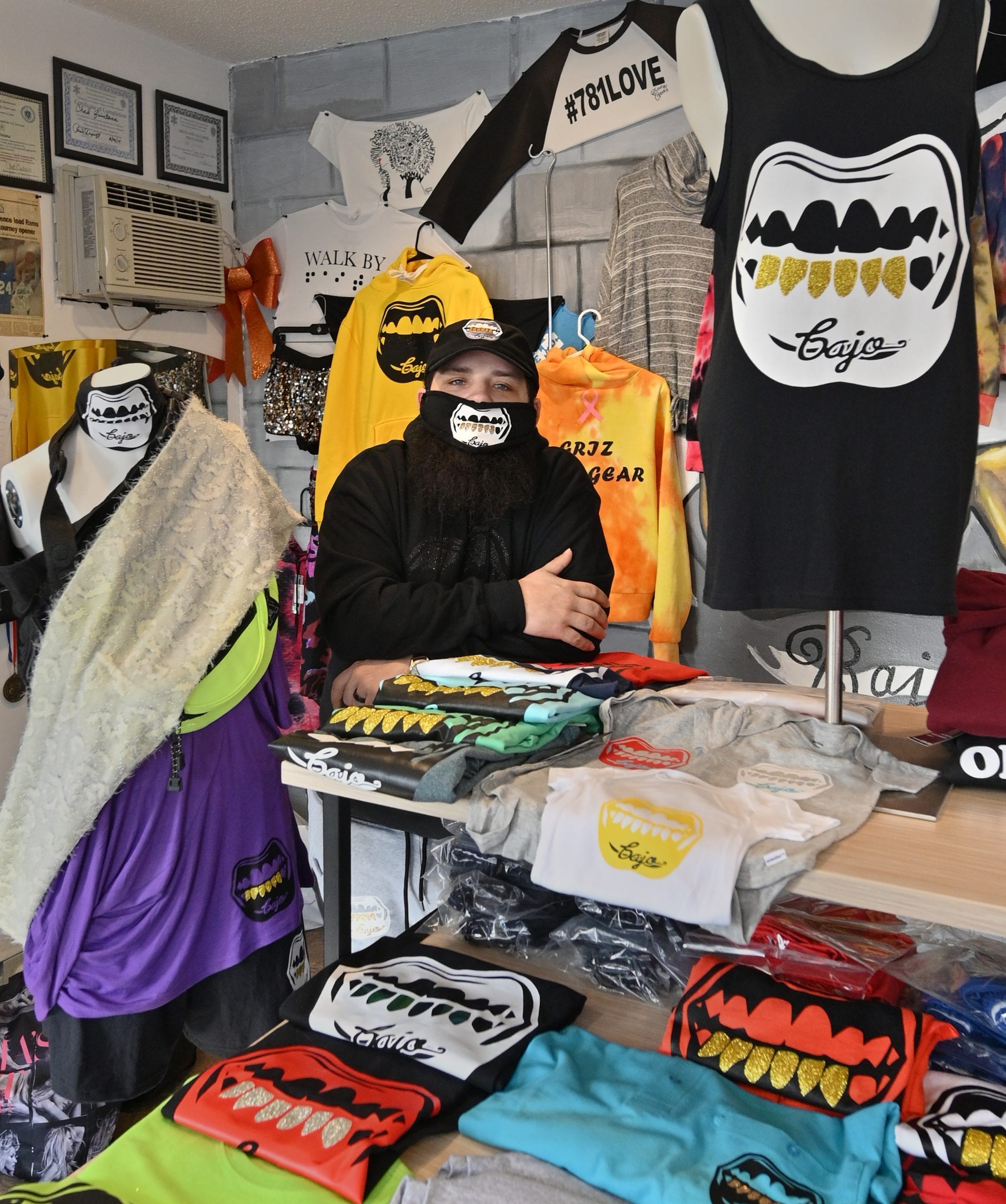LYNN — Chad Quintana uses his store, Bajo Corner on 517 Boston Street, to give back to the city that raised him.
Bajo Corner operates partly as a clothing store, partly as a hub for donations of clothes and toys, and partly as a place of community for local kids.
The shop is packed with clothes stamped with Quintana’s GRIZ logo — a snarling mouth tinted with gold — along with piles of donations of clothes, toys and furniture. In the morning, the front door is often blocked with bags of donated items.
“Every day I come in there’s 10, 15 bags,” said Quintana, sporting a GRIZ mask over his thick beard. “The city is very generous. We try to keep the cycle going and look out for one another.”
The Classical graduate had a tough upbringing in Lynn, moving around every year, from Elm Street, to Summer Street, to the Highlands.
He looked up to local drug dealers and got involved in crime at a young age. He was stabbed at age 13 (also the age when he bought his first gun), shot at 18, and incarcerated at 19 on a charge of attempted murder.
“I was completely lost,” he said. “I know for damn sure I was a menace.”
He did two stints in jail, totaling about four years. While incarcerated the first time, he said he started to take the first steps to get his life together.
“I saw people I knew from high school setting records and graduating college,” he said. “And I was like, I can’t be 30, 40 years old and still doing this.”
He began taking classes and got involved in The Straight Ahead Program, which helped him begin to build his resume and earn certifications that got him jobs on the outside.
The certificates that he earned in jail hang on on the wall of the store.
But when he was first released on probation he struggled to go straight.
“It was tough,” he said. “I got back into the same stuff.”
One night, Quintana was drunk at a party and got into an altercation with a police officer.
He was given the choice of going back to jail or extending his probation until 2022, and he chose the former option, because he thought the stability would be good for him.
When he was released the second time, the changes stuck. This time, he kept his focus, designed his GRIZ brand with the help of a friend, and began by selling clothes from the back of his car.
In 2017, he was able to open Bajo Corner, which he has been operating ever since. GRIZ clothes are now sold in 36 states and 15 countries, he said.
Part of the change in Quintana’s life was his sobriety. The party was his last time he drank or did drugs. He has been clean and sober for the six years since.
“I put the liquor down and now my mind’s clearer,” he said.
A lot of the business done at Bajo Corner is informal. Quintana said that he recently traded a man a hoodie in exchange for painting the front of his store.
Quintana spreads donations both locally and globally, sending bags of clothing to victims of natural disasters in Florida and Haiti, and giving out items to people who walk into his store.
He encourages those who are struggling to come into his shop and pick up something that they need.
“Some people can be shy or ashamed of their situation. I used to be ashamed. I was willing to go to jail instead of asking somebody for help,” he said.
He said that clothing donations had actually increased in 2020, a silver lining of the COVID-19 pandemic.
“Nobody realized how much people really needed until this year,” he said. “The moment is bad, but I feel like we’re getting more compassionate and starting to put ourselves in other people’s shoes.”
He also builds relationships with kids in the community, either through speaking about his experience at schools, offering them small jobs to teach responsibility, or just talking to students who go to the store to hang out.
He gives kids the incentive to succeed in school by offering GRIZ gear to any students who make the honor roll, and hopes that kids who hear his story will be encouraged to get on the right track.
“I feel that a story like this could benefit so many people because that’s what I wanted when I was a kid,” said Quintana. “I wanted someone that was an older figure that I could look up to. But not once did I have anyone sit me down and ask me how I’m doing, what’s going on in my home. I just wanted somebody to listen to me.”

